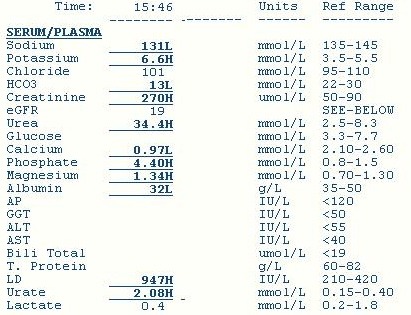Here are the practice questions from this week’s written exam practice at The Alfred ICU, with recommended reading from Lifeinthefastlane.com’s Critical Care Compendium and (this week) ICM Case Summaries:
Q1.
a) A 30 year-old woman presents with abdominal pain and paraesthesia. She was diagnosed with CML 2 months previously and is being treated with chemotherapy.
These are her blood test results:
- Describe the abnormalities and give the likely pathophysiological explanation for each. (35%)
- What specific therapies (other than resuscitation and supportive care) are appropriate? (35%)
b) Regarding patients with haematological malignancies admitted to ICU:
- List 3 likely reasons for an overall improvement in mortality over the past 20 years (15%)
- List 3 important risk factors for increased mortality in this patient group (15%)
Learn more here:
- http://lifeinthefastlane.com/oncology-quandary-005/
- http://lifeinthefastlane.com/ccc/tumour-lysis-syndrome/
- http://icmcasesummaries.com/2015/08/26/outcomes-of-icu-admission-with-haematological-malignancy/
Q2.
Discuss how your approach to cardiac arrest occurring in a post-cardiac surgery patient in the ICU differs from the standard ALS approach. (100%)
Learn more here:
- http://lifeinthefastlane.com/ccc/cardiac-arrest-management-after-cardiac-surgery/
- http://lifeinthefastlane.com/ccc/advanced-life-support/
Q3.
An obtunded patient on the ward is found to have hyperammonaemia.
- List the differential diagnosis for the underlying cause(s) of hyperammonaemia (40%)
- List investigations that are useful for determining the underlying cause (20%)
- Discuss the pros and cons of serum ammonia as an investigation in patients with encephalopathy (40%)
Learn more here:
You can access all the previous practice questions since 2014 here:
https://docs.google.com/document/d/1_Ta8IvVaVtc5Il7-kJwj6qKGu54OmifJGRUWCXud8dY/edit
See this link on INTENSIVE for exam resources:
https://intensiveblog.com/resources/#3
